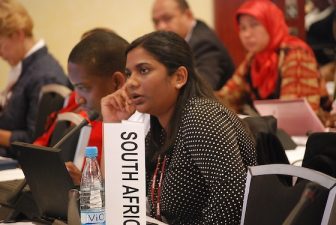 A sea level rise of 100 inches or eight feet in Ar Ru’ays, a city at the northern tip of Qatar, would render 100 percent of the population homeless. Considered one of the top ten developing nations that is most vulnerable to rising seas, the host of the 18th Conference of the Parties to the UNFCCC has good reason to push for a successful meeting.
A sea level rise of 100 inches or eight feet in Ar Ru’ays, a city at the northern tip of Qatar, would render 100 percent of the population homeless. Considered one of the top ten developing nations that is most vulnerable to rising seas, the host of the 18th Conference of the Parties to the UNFCCC has good reason to push for a successful meeting.
17,000 delegates from around the world have gathered in Doha and so much is at stake. This year the existing Kyoto Protocol expires and Canada, Russia, Japan and New Zealand have said they won’t sign on for another round. Those nations that have committed to an amendment must agree on the terms and expiry date, while the battle between developing and developed countries, and who should bear responsibility, desperately needs to be resolved.
Doha conference blasts off
Monday marked the official handover from South Africa to Qatar, and the President of COP 18, Abdullah Bin Hamad Al-Attiyah, took his role as an agent for change seriously.
He told participants at the opening ceremony that “climate change is a common challenge for humanity” and that the Conference was a “golden opportunity – we must make best use of it.”
“I stand ready to continue listening to you,” Mr. Al-Attiyah added.
In the coming days, he will “participate in numerous official and unofficial consultations with all parties and observers in an effort to push forward dialogue and to find a positive solution to climate change,” according to a COP 18 press release.
Until now, most of the discourse surrounding Qatar’s role as host has centered on the emirate’s gold-studded, carbon heavy lifestyle. And it’s true that per capita, residents of the country are among the world’s biggest polluters.
Why Qatar cares about climate change
But that line of questioning fails to acknowledge what must keep the ruling Al Thani family awake at night: an extreme rise in sea levels could swallow up Qatar’s coastline.
A recent World Bank report shows that we are on track for a global temperature rise of four degrees, two degrees higher than what most scientists believe is a manageable rise. And with that rise come drier dry nations, wetter wet nations, hotter hot nations, less ice, more water, and inundated coastal regions.
“Now more than ever, the issues at the heart of these negotiations are at the forefront of global debate and discourse. All seven billion people living on the planet share a single challenge: climate change,” Mr Al-Attiyah has said.
“This is why we gather at the highest official levels in an international framework; this is our mission. If we do not make the changes we need to now, it will soon be too late. We must decide whether we let our lifestyles jeopardise our life.”



